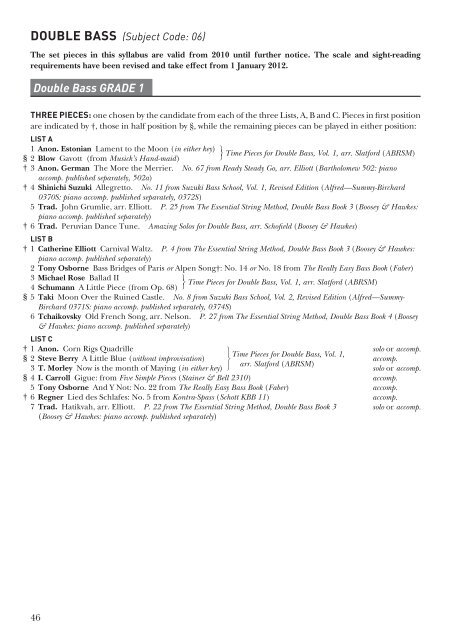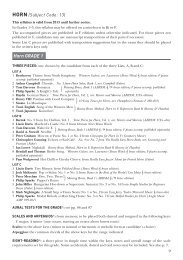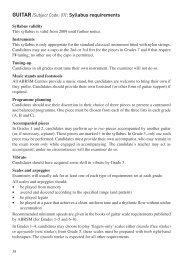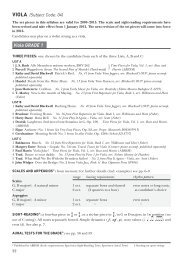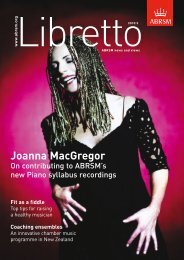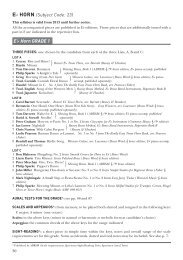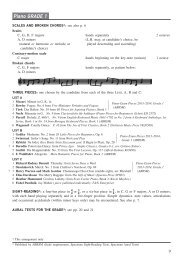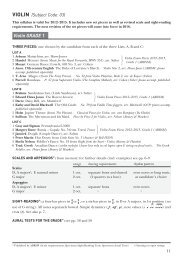You also want an ePaper? Increase the reach of your titles
YUMPU automatically turns print PDFs into web optimized ePapers that Google loves.
DOUBLE BASS (Subject Code: 06)<br />
The set pieces in this syllabus are valid from 2010 until further notice. The scale and sight-reading<br />
requirements have been revised and take effect from 1 January <strong>2012</strong>.<br />
<strong>Double</strong> <strong>Bass</strong> <strong>GRADE</strong> 1<br />
THREE PIECES: one chosen by the candidate from each of the three Lists, A, B and C. Pieces in first position<br />
are indicated by †, those in half position by §, while the remaining pieces can be played in either position:<br />
LIST A<br />
1 Anon. Estonian Lament to the Moon (in either key) ¸<br />
˝ Time Pieces for <strong>Double</strong> <strong>Bass</strong>, Vol. 1, arr. Slatford (ABRSM)<br />
§ 2 Blow Gavott (from Musick’s Hand-maid) ˛<br />
† 3 Anon. German The More the Merrier. No. 67 from Ready Steady Go, arr. Elliott (Bartholomew 502: piano<br />
accomp. published separately, 502a)<br />
† 4 Shinichi Suzuki Allegretto. No. 11 from Suzuki <strong>Bass</strong> School, Vol. 1, Revised Edition (Alfred—Summy-Birchard<br />
0370S: piano accomp. published separately, 0372S)<br />
5 Trad. John Grumlie, arr. Elliott. P. 25 from The Essential String Method, <strong>Double</strong> <strong>Bass</strong> Book 3 (Boosey & Hawkes:<br />
piano accomp. published separately)<br />
† 6 Trad. Peruvian Dance Tune. Amazing Solos for <strong>Double</strong> <strong>Bass</strong>, arr. Schofield (Boosey & Hawkes)<br />
LIST B<br />
† 1 Catherine Elliott Carnival Waltz. P. 4 from The Essential String Method, <strong>Double</strong> <strong>Bass</strong> Book 3 (Boosey & Hawkes:<br />
piano accomp. published separately)<br />
2 Tony Osborne <strong>Bass</strong> Bridges of Paris or Alpen Song†: No. 14 or No. 18 from The Really Easy <strong>Bass</strong> Book (Faber)<br />
3 Michael Rose Ballad II ¸<br />
˝ Time Pieces for <strong>Double</strong> <strong>Bass</strong>, Vol. 1, arr. Slatford (ABRSM)<br />
4 Schumann A Little Piece (from Op. 68) ˛<br />
§ 5 Taki Moon Over the Ruined Castle. No. 8 from Suzuki <strong>Bass</strong> School, Vol. 2, Revised Edition (Alfred—Summy-<br />
Birchard 0371S: piano accomp. published separately, 0374S)<br />
6 Tchaikovsky Old French Song, arr. Nelson. P. 27 from The Essential String Method, <strong>Double</strong> <strong>Bass</strong> Book 4 (Boosey<br />
& Hawkes: piano accomp. published separately)<br />
LIST C<br />
† 1 Anon. Corn Rigs Quadrille<br />
¸<br />
solo or accomp.<br />
§<br />
Time Pieces for <strong>Double</strong> <strong>Bass</strong>, Vol. 1,<br />
2 Steve Berry A Little Blue (without improvisation) ˝<br />
accomp.<br />
3 T. Morley Now is the month of Maying (in either key) ˛<br />
arr. Slatford (ABRSM)<br />
solo or accomp.<br />
§ 4 I. Carroll Gigue: from Five Simple Pieces (Stainer & Bell 2310)<br />
accomp.<br />
5 Tony Osborne And Y Not: No. 22 from The Really Easy <strong>Bass</strong> Book (Faber)<br />
accomp.<br />
† 6 Regner Lied des Schlafes: No. 5 from Kontra-Spass (Schott KBB 11)<br />
accomp.<br />
7 Trad. Hatikvah, arr. Elliott. P. 22 from The Essential String Method, <strong>Double</strong> <strong>Bass</strong> Book 3 solo or accomp.<br />
(Boosey & Hawkes: piano accomp. published separately)<br />
46
or<br />
<strong>Double</strong> <strong>Bass</strong> <strong>GRADE</strong> 1<br />
SCALES AND ARPEGGIOS*: from memory; for further details (incl. examples) see pp. 6–9<br />
Group 1 (first position) or Group 2 (half position), at candidate’s choice †<br />
GROUP 1<br />
Scales<br />
C, D majors<br />
G major; A natural minor<br />
range bowing requirements rhythm pattern<br />
a 6th<br />
1 oct.<br />
separate bows and slurred<br />
(2 quavers to a bow)<br />
Arpeggios<br />
G major; A minor 1 oct. separate bows even notes<br />
GROUP 2<br />
Scales<br />
C major<br />
F, Bb majors; A natural minor<br />
a 6th<br />
1 oct.<br />
separate bows and slurred<br />
(2 quavers to a bow)<br />
Arpeggios<br />
F, Bb majors; A minor 1 oct. separate bows even notes<br />
even notes or long tonic,<br />
at candidate’s choice<br />
even notes or long tonic,<br />
at candidate’s choice<br />
SIGHT-READING*: 1st or half position, at candidate’s choice †. A four-bar piece in 4 4 or 3 4 , or a six-bar piece<br />
in 2 4 , in G or D majors (no use of E and A strings) or F or Bb majors (no use of G string). All notes<br />
separately bowed. Simple dynamics (f, F, p), note values (h q qq qqqq) and rests (Π). See also p. 7.<br />
AURAL TESTS FOR THE <strong>GRADE</strong>*: see pp. 58 and 59<br />
† The examiner will ask which Group/position<br />
* Published by ABRSM (Scale requirements, Specimen Sight-Reading Tests, Specimen Aural Tests)<br />
47
<strong>Double</strong> <strong>Bass</strong> <strong>GRADE</strong> 2<br />
THREE PIECES: one chosen by the candidate from each of the three Lists, A, B and C:<br />
LIST A<br />
1 attrib. J. S. Bach Musette (BWV Anh. II 126).<br />
¸ The Anna Magdalena Bach Notebook for <strong>Double</strong> <strong>Bass</strong>, arr.<br />
P. 9 from<br />
Ó Elliott (Bartholomew 009: piano accomp. published<br />
2 Petzold Minuet in D (BWV Anh. II 114). Ï<br />
separately, 009a)<br />
P. 3 from ˛<br />
3 Boccherini Minuetto (from String Quartet, Op. 24 No. 4). Time Pieces for <strong>Double</strong> <strong>Bass</strong>, Vol. 1, arr. Slatford<br />
(ABRSM)<br />
4 Handel Gavotte, arr. Elliott (upper line). P. 10 from ¸The<br />
Essential String Method, <strong>Double</strong> <strong>Bass</strong> Book 4 (Boosey<br />
˝<br />
5 Trad. English Greensleeves, arr. Elliott. P. 26 from ˛ & Hawkes: piano accomp. published separately)<br />
6 Mozart Passe-pied (observing repeats). No. 9 from La Contrebasse classique, Vol. A, arr. Dehant (Combre C05440)<br />
LIST B<br />
1 Beethoven Andante cantabile (from String Quartet, Op. 18 No. 5) ¸ Time Pieces for <strong>Double</strong> <strong>Bass</strong>, Vol. 1,<br />
˝<br />
2 Michael Rose Ballad I<br />
˛ arr. Slatford (ABRSM)<br />
3 Rodgers & Hammerstein Edelweiss (from The Sound of Music). No. 50 from Abracadabra <strong>Double</strong> <strong>Bass</strong>, Book 1,<br />
arr. Lillywhite et al. (Black: piano accomp. published separately)<br />
4 Schubert Two German Dances, arr. Nelson (omitting DC). P. 23 from The Essential String Method, <strong>Double</strong> <strong>Bass</strong><br />
Book 4 (Boosey & Hawkes: piano accomp. published separately)<br />
5 Schumann The Merry Peasant (The Happy Farmer). P. 18 (arr. Elliott) from The Essential String Method,<br />
<strong>Double</strong> <strong>Bass</strong> Book 4 (Boosey & Hawkes: piano accomp. published separately) or No. 7 from Suzuki <strong>Bass</strong> School, Vol. 2,<br />
Revised Edition (Alfred—Summy-Birchard 0371S: piano accomp. published separately, 0374S)<br />
6 Weber Ecossaise (upper line, observing repeats). P. 7 from Technitunes for <strong>Double</strong> <strong>Bass</strong>, arr. Nelson and Elliott<br />
(Boosey & Hawkes: piano accomp. published separately)<br />
LIST C<br />
1 Arlen & Harburg We’re off to see the Wizard (from The Wizard of Oz). No. 70 from Abra -<br />
cadabra <strong>Double</strong> <strong>Bass</strong>, Book 1, arr. Lillywhite et al. (Black: piano accomp. published separately)<br />
2 Christopher Field Ladye Broomleigh Her Pavane.<br />
No. 45 from<br />
¸<br />
Yorke Studies for <strong>Double</strong> <strong>Bass</strong>,<br />
Ó<br />
3 Trad. Scottish Ye Banks and Braes, arr. Slatford. Ï Vol. 1 (Yorke YE0022)<br />
No. 73 from ˛<br />
4 Herz Galoppe ¸<br />
˝ Time Pieces for <strong>Double</strong> <strong>Bass</strong>, Vol. 1, arr. Slatford (ABRSM)<br />
5 Giles Swayne Lazybones ˛<br />
6 Regner Maitanz: No. 2 from Kontra-Spass (Schott KBB 11)<br />
7 Trad. March of the Kings, arr. Elliott. P. 25 from The Essential String Method, <strong>Double</strong> <strong>Bass</strong><br />
Book 4 (Boosey & Hawkes: piano accomp. published separately)<br />
SCALES AND ARPEGGIOS*: from memory; for further details (incl. examples) see pp. 6–9<br />
Scales<br />
F, G, Bb, D majors; A, B minors<br />
(minors natural or harmonic,<br />
at candidate’s choice)<br />
48<br />
range bowing requirements rhythm pattern<br />
1 oct. separate bows and slurred<br />
(2 quavers to a bow)<br />
Arpeggios<br />
F, G, Bb majors; A, B minors 1 oct. separate bows even notes<br />
even notes or long tonic,<br />
at candidate’s choice<br />
SIGHT-READING*: an eight-bar piece, time signatures as Grade 1, in C, G, D majors or A natural minor,<br />
in 1st position. Notes separately bowed or with simple two-note slurs. Addition of P, ‘hairpins’ (cresc./<br />
dim.), dotted minim, and minim rest. See also p. 7.<br />
AURAL TESTS FOR THE <strong>GRADE</strong>*: see pp. 58 and 59<br />
* Published by ABRSM (Scale requirements, Specimen Sight-Reading Tests, Specimen Aural Tests)<br />
accomp.<br />
solo<br />
solo<br />
accomp.<br />
accomp.<br />
accomp.<br />
solo or accomp.
<strong>Double</strong> <strong>Bass</strong> <strong>GRADE</strong> 3<br />
THREE PIECES: one chosen by the candidate from each of the three Lists, A, B and C:<br />
LIST A<br />
1 Azaïs Menuet. No. 22 from La Contrebasse classique, Vol. A, arr. Dehant (Combre C05440)<br />
2 attrib. J. S. Bach First Minuet in D minor (BWV Anh. II 121) (observing 1st repeat). P. 9 from The Anna<br />
Magdalena Bach Notebook for <strong>Double</strong> <strong>Bass</strong>, arr. Elliott (Bartholomew 009: piano accomp. published separately, 009a)<br />
3 L. Couperin Menuet de Poitou (omitting DC) ¸ Time Pieces for <strong>Double</strong> <strong>Bass</strong>, Vol. 1,<br />
˝<br />
4 Lully Air and Chaconne (from Le bourgeois gentilhomme) ˛ arr. Slatford (ABRSM)<br />
5 Gerhard Deutschmann Menuett and Trio. No. 9 from Yorke Solos for <strong>Double</strong> <strong>Bass</strong>, Vol. 1 (Yorke YE0087)<br />
6 Mozart Allegro (K. 3). No. 2 from Subterranean Solos, arr. Hartley (Bartholomew 006: piano accomp. published<br />
separately, 006a)<br />
LIST B<br />
1 Grieg Norwegian Dance (Op. 35). No. 5 from Subterranean Solos, arr. Hartley (Bartholomew 006: piano accomp.<br />
published separately, 006a)<br />
2 Gurlitt Voyage de nuit. No. 20 from La Contrebasse classique, Vol. A, arr. Dehant (Combre C05440)<br />
3 Sheila Joynes The Old Sea Dog. No. 52 from <strong>Bass</strong> is Best! Yorke Mini-<strong>Bass</strong> Book 2, arr. Emery and Barratt (Yorke<br />
YE0098 )<br />
4 John Merle Mummers (Danse grotesque). Festival Performance Solos – String <strong>Bass</strong> (Carl Fischer BF5: piano<br />
accomp. published separately, BF6)<br />
5 Schumann Melody (from Op. 68). Time Pieces for <strong>Double</strong> <strong>Bass</strong>, Vol. 1, arr. Slatford (ABRSM)<br />
6 Verdi Grand March (from Aïda). Amazing Solos for <strong>Double</strong> <strong>Bass</strong>, arr. Schofield (Boosey & Hawkes)<br />
LIST C<br />
1 Aprile Solfeggio No. 3 (upper part) (ornaments optional). Time Pieces for <strong>Double</strong> <strong>Bass</strong>,<br />
Vol. 1, arr. Slatford (ABRSM) († with the published piano (not double bass) accomp.)<br />
2 Frederick Boaden Prelude: 1st movt from Petite Suite (Yorke YEC47358 )<br />
3 Teppo Hauta-aho Scott: 3rd movt from Jazz Sonatine [No. 1]. No. 1 from Hauta-aho<br />
Pizzicato Pieces, Book 1 (Recital Music RM097 )<br />
4 Mozart, trans. Hindemith O Iso ed Osiro. Hindemith Stücke für Kontrabass solo<br />
(Schott ED 8378 )<br />
5 Tony Osborne <strong>Bass</strong>a Nova (pizz or arco or combination): No. 3 from Junior Jazz Book 1<br />
(Recital Music RM037 )<br />
6 Michael Rose Jumbo Rag: from A Sketchbook for <strong>Double</strong> <strong>Bass</strong> (ABRSM)<br />
7 David Tutt Spanish Dance. No. 8 from <strong>Bass</strong> is Best! Yorke Mini-<strong>Bass</strong> Book 2, arr. Emery and<br />
Barratt (Yorke YE0098 )<br />
SCALES AND ARPEGGIOS*: from memory; for further details (incl. examples) see pp. 6–9<br />
Scales<br />
E, A, C, D majors; E, G, D minors<br />
(minors harmonic or melodic,<br />
at candidate’s choice)<br />
range bowing requirements rhythm pattern<br />
1 oct. separate bows and slurred<br />
(2 quavers to a bow)<br />
Arpeggios<br />
E, A, C, D majors; E, G, D minors 1 oct. separate bows and slurred<br />
(2 notes to a bow)<br />
even notes or long tonic,<br />
at candidate’s choice<br />
even notes<br />
Chromatic scale<br />
Starting on A 1 oct. separate bows even notes<br />
SIGHT-READING*: an eight-bar piece, time and key signatures as Grade 2, with the addition of F, Bb<br />
majors and B minor, in half or 1st position. Occasional accidentals (within minor keys only). Dotted<br />
rhythms, semiquavers and ties may be encountered. Pizzicato (at end of piece only) and staccato may be<br />
included. Increasing use of dynamics, rests and slurs. See also p. 7.<br />
AURAL TESTS FOR THE <strong>GRADE</strong>*: see pp. 58 and 60<br />
solo or accomp.†<br />
accomp.<br />
solo<br />
solo<br />
accomp.<br />
accomp.<br />
accomp.<br />
49
<strong>Double</strong> <strong>Bass</strong> <strong>GRADE</strong> 4<br />
THREE PIECES: one chosen by the candidate from each of the three Lists, A, B and C:<br />
LIST A<br />
1 attrib. J. S. Bach Minuet in C (BWV Anh. II 116). P. 5 from The Anna Magdalena Bach Notebook for <strong>Double</strong><br />
<strong>Bass</strong>, arr. Elliott (Bartholomew 009: piano accomp. published separately, 009a) or No. 2 from Suzuki <strong>Bass</strong> School,<br />
Vol. 3, Revised Edition (Alfred—Summy-Birchard 0376S: piano accomp. published separately, 0377S )<br />
2 J. S. Bach Gavotte and Musette, arr. Slatford. No. 20 from ¸ Yorke Solos for <strong>Double</strong> <strong>Bass</strong>, Vol. 1<br />
˝<br />
3 Mozart A Little Melody, arr. Láska. No. 23 from ˛ (Yorke YE0087 )<br />
4 Froberger Gigue (ornaments optional ) ¸ Time Pieces for <strong>Double</strong> <strong>Bass</strong>, Vol. 2, arr. Slatford<br />
˝<br />
5 Handel Allegro (from Concerto grosso, Op. 6 No. 8) ˛ (ABRSM)<br />
6 A. Thomas Gavotte (from Mignon). No. 7 from Subterranean Solos, arr. Hartley (Bartholomew 006: piano accomp.<br />
published separately, 006a)<br />
LIST B<br />
1 Grieg Hunting Song (Op. 4 No. 4) ¸ Time Pieces for <strong>Double</strong> <strong>Bass</strong>, Vol. 2, arr. Slatford<br />
˝<br />
2 Mendelssohn Venetian Gondola Song (from Op. 57) ˛ (ABRSM)<br />
3 Humperdinck Fiddler’s Song (from Königskinder). Amazing Solos for <strong>Double</strong> <strong>Bass</strong>, arr. Schofield (Boosey & Hawkes)<br />
4 S. Lancen Si j’étais … Moussorgsky. No. 13 from Yorke Solos for <strong>Double</strong> <strong>Bass</strong>, Vol. 1 (Yorke YE0087 )<br />
5 J. F. Müller Neapolitan Dance (Neil Kjos Music KJ15920 )<br />
6 Michael Rose Reverie: from A Sketchbook for <strong>Double</strong> <strong>Bass</strong> (ABRSM)<br />
LIST C<br />
1 A. Benjamin Jamaican Rumba ¸<br />
˝ Time Pieces for <strong>Double</strong> <strong>Bass</strong>, Vol. 2, arr. Slatford (ABRSM)<br />
2 Kabalevsky Cavalryman (from Op. 27) ˛<br />
3 Frederick Boaden Elegy: 2nd movt from Petite Suite (Yorke YEC47358 )<br />
4 Bottesini Study No. 4 or No. 9: from Method for <strong>Double</strong> <strong>Bass</strong>, Part 1 (Yorke YE0076 )<br />
5 Christopher Field Hornpipe: No. 4 from Mock Baroque. No. 108/4 from Yorke Studies for <strong>Double</strong><br />
<strong>Bass</strong>, Vol. 2 (Yorke YE0086 )<br />
6 Teppo Hauta-aho Allegro moderato: 1st movt from Jazz Sonatine No. 2 (Recital Music RM333 )<br />
7 Regner Der Clown tritt auf: No. 8 from Kontra-Spass (Schott KBB 11 )<br />
SCALES AND ARPEGGIOS*: from memory; for further details (incl. examples) see pp. 6–9<br />
Scales<br />
E, F, G, A majors; E, G, A minors<br />
(minors harmonic or melodic,<br />
at candidate’s choice)<br />
50<br />
range bowing requirements rhythm pattern<br />
a 12th separate bows and slurred<br />
(2 quavers to a bow)<br />
Arpeggios<br />
E, F, G, A majors; E, G, A minors a 12th separate bows and slurred<br />
(3 notes to a bow)<br />
even notes or long tonic,<br />
at candidate’s choice<br />
even notes<br />
Dominant sevenths (resolving on tonic)<br />
In the keys of A and Bb 1 oct. separate bows even notes<br />
Chromatic scales<br />
Starting on G and B 1 oct. separate bows and slurred<br />
(3 notes to a bow)<br />
even notes<br />
SIGHT-READING*: a piece of around eight bars in length, time and key signatures as Grade 3, with the<br />
addition of 6 8 , A major, E and D minors. Shifts between half, 1st and 3rd positions may be encountered<br />
(but no more than two positions per test). Occasional chromatic notes. Anacrusis, hooked bowing, accents<br />
and pause signs may be included. See also p. 7.<br />
AURAL TESTS FOR THE <strong>GRADE</strong>*: see pp. 58 and 60<br />
* Published by ABRSM (Scale requirements, Specimen Sight-Reading Tests, Specimen Aural Tests)<br />
accomp.<br />
accomp.<br />
accomp.<br />
solo<br />
solo<br />
solo<br />
accomp.
<strong>Double</strong> <strong>Bass</strong> <strong>GRADE</strong> 5<br />
THREE PIECES: one chosen by the candidate from each of the three Lists, A, B and C:<br />
LIST A<br />
1 Corelli Sarabanda (Largo): 3rd movt from Sonata in D minor [C minor], trans. Zimmermann (IMC 1766 )<br />
2 attrib. Giovannino Adagio and Aria staccata e allegra: 1st and 2nd movts from Sonata in A minor (Yorke YE0008 )<br />
3 Handel Bourree. No. 8 from Suzuki <strong>Bass</strong> School, Vol. 3, Revised Edition (Alfred—Summy-Birchard 0376S: piano<br />
accomp. published separately, 0377S)<br />
4 S. Paxton Allegretto: 1st movt from Sonata in D, Op. 3 No. 2, trans. Elliott (Bartholomew 005)<br />
5 Rameau Dance. No. 68 from <strong>Bass</strong> is Best! Yorke Mini-<strong>Bass</strong> Book 2, arr. Emery and Barratt (Yorke YE0098 )<br />
6 Rameau Le Lardon and La Boiteuse. Time Pieces for <strong>Double</strong> <strong>Bass</strong>, Vol. 2, arr. Slatford (ABRSM)<br />
LIST B<br />
1 Fauré Autumn (Op. 18 No. 3) ¸<br />
˝ Time Pieces for <strong>Double</strong> <strong>Bass</strong>, Vol. 2, arr. Slatford (ABRSM)<br />
2 Spohr Allegro (from String Quartet, Op. 4 No. 2) ˛<br />
3 Massenet Mélodie (Op. 10), arr. Zimmermann ¸ Festival Performance Solos – String <strong>Bass</strong> (Carl Fischer BF5:<br />
˝<br />
4 Trad. The Jolly Dutchman, arr. Isaac ˛ piano accomp. published separately, BF6 )<br />
5 Chester Minkler A Gaelic Melody. No. 11 from Suzuki <strong>Bass</strong> School, Vol. 3, Revised Edition (Alfred—Summy-<br />
Birchard 0376S: piano accomp. published separately, 0377S)<br />
6 Pascal Proust Le bon barbu rond (Combre C06174 )<br />
LIST C<br />
1 L. Bernstein Cool (from West Side Story). Amazing Solos for <strong>Double</strong> <strong>Bass</strong>, arr. Schofield<br />
(Boosey & Hawkes )<br />
2 Bottesini Study No. 18 or No. 32: from Method for <strong>Double</strong> <strong>Bass</strong>, Part 1 (Yorke YE0076 )<br />
3 Tyrone Brown Walking Song (p. 14 only, observing 1st repeat): from Compositions for <strong>Bass</strong><br />
(Mel Bay)<br />
4 I. Carroll Polish Mazurka or Cuban Rumba: from Five National Dances (Stainer & Bell H290 )<br />
5 Miles Davis So What, arr. Swaim. No. 10 from Suzuki <strong>Bass</strong> School, Vol. 3, Revised Edition<br />
(Alfred—Summy-Birchard 0376S: piano accomp. published separately, 0377S )<br />
6 Ray Henderson Black Bottom. Time Pieces for <strong>Double</strong> <strong>Bass</strong>, Vol. 2, arr. Slatford (ABRSM)<br />
7 L. Shitte Étude. No. 63 from <strong>Bass</strong> is Best! Yorke Mini-<strong>Bass</strong> Book 2, arr. Emery and Barratt<br />
(Yorke YE0098 )<br />
SCALES AND ARPEGGIOS*: from memory; for further details (incl. examples) see pp. 6–9<br />
Scales<br />
Eb, G † majors<br />
F, Bb, C majors; F, Bb, C minors<br />
(minors harmonic or melodic,<br />
at candidate’s choice)<br />
Arpeggios<br />
Eb, G † majors<br />
F, Bb, C majors; F, Bb, C minors<br />
range bowing requirements rhythm pattern<br />
1 oct.<br />
a 12th<br />
1 oct.<br />
a 12th<br />
separate bows and slurred<br />
(2 beats to a bow)<br />
separate bows and slurred<br />
(3 notes to a bow)<br />
Dominant sevenths (resolving on tonic)<br />
In the keys of F and Ab 1 oct. separate bows and slurred<br />
(2 notes to a bow)<br />
even notes or long tonic,<br />
at candidate’s choice<br />
even notes<br />
"<br />
even notes<br />
Diminished sevenths<br />
Starting on E and A 1 oct. separate bows even notes<br />
Chromatic scales<br />
Starting on D and Eb 1 oct. separate bows and slurred<br />
(3 notes to a bow)<br />
(continued overleaf )<br />
† Starting one octave above bottom G<br />
even notes<br />
accomp.<br />
solo<br />
solo<br />
accomp.<br />
accomp.<br />
accomp.<br />
solo or accomp.<br />
51
<strong>Double</strong> <strong>Bass</strong> <strong>GRADE</strong> 5<br />
SIGHT-READING*: a piece of around eight to sixteen bars in length, time and key signatures as Grade 4,<br />
with the addition of G minor. Highest note E (e' ): shifts as required to cover this range. Changes between<br />
arco and pizzicato, simple syncopation and a slowing of tempo at the end may be encountered. See also<br />
p. 7.<br />
AURAL TESTS FOR THE <strong>GRADE</strong>*: see pp. 58 and 61<br />
<strong>Double</strong> <strong>Bass</strong> <strong>GRADE</strong> 6<br />
PREREQUISITE FOR ENTRY: Grade 5 (or above) in Theory of Music, Practical Musicianship or any solo<br />
Jazz subject.<br />
THREE PIECES: one chosen by the candidate from each of the three Lists, A, B and C:<br />
LIST A<br />
1 Capuzzi Rondo (Allegro): 3rd movt from Concerto in D (Yorke YE0011 )<br />
2 Galliard Adagio and Allegro: 1st and 2nd movts from Sonata in D minor, trans. Drew. String Festival Solos,<br />
<strong>Double</strong> <strong>Bass</strong> Vol. 2 (Alfred—Belwin EL95110: piano accomp. published separately, EL95109 )<br />
3 Giordani Larghetto. Two Eighteenth-Century Pieces, arr. Sterling (Stainer & Bell H468 )<br />
4 B. Marcello Largo and Allegro: 3rd and 4th movts from Sonata in F, Op. 2 No. 1. Marcello Six Sonatas<br />
(Schirmer GS26269 )<br />
5 S. Paxton The Bush aboon Traquair (A Scots Air) and Vivace: 2nd and 3rd movts from Sonata in D, Op. 3<br />
No. 2, trans. Elliott (Bartholomew 005)<br />
6 Vivaldi Allegro: 4th movt from Sonata No. 1 in B b, RV 47. Vivaldi Complete Sonatas for Violoncello (Bärenreiter<br />
BA 6995) or (separately, trans. Zimmermann: IMC 2302 )<br />
LIST B<br />
1 Beethoven Sonatina. No. 6 from Solos for the <strong>Double</strong> <strong>Bass</strong> Player, arr. Zimmermann (Schirmer GS33083 )<br />
2 Gabriel-Marie La Cinquantaine. No. 6 from Suzuki <strong>Bass</strong> School, Vol. 4 (Alfred—Summy-Birchard 28359: piano<br />
accomp. published separately, 28360 ) or (separately, arr. Elliott: Bartholomew 001)<br />
3 Keÿper Romance: No. 1 from Romance and Rondo (Yorke YE0030 )<br />
4 John Merle Caballero. Festival Performance Solos – String <strong>Bass</strong> (Carl Fischer BF5: piano accomp. published<br />
separately, BF6 )<br />
5 Pascal Proust Arcades (Combre C5483 )<br />
6 John Walton A Deep Song (Yorke YE0005 )<br />
LIST C<br />
1 L. Bernstein America (from West Side Story) (observing repeats). Amazing Solos for <strong>Double</strong> <strong>Bass</strong>,<br />
arr. Schofield (Boosey & Hawkes )<br />
2 Bottesini Study No. 40 or No. 50: from Method for <strong>Double</strong> <strong>Bass</strong>, Part 1 (Yorke YE0076 )<br />
3 Derek Bourgeois Allegro commodo: No. 3 from Fantasy Pieces for <strong>Double</strong> <strong>Bass</strong> (Brass Wind)<br />
4 Gavin Bryars Room 42. Time Pieces for <strong>Double</strong> <strong>Bass</strong>, Vol. 2, arr. Slatford (ABRSM)<br />
5 P. M. Dubois Le gai cascadeur (Le Rideau Rouge RR1068 )<br />
6 Teppo Hauta-aho A Little Waltz (Pieni Valssi): from Teppo’s Tunes (Recital Music RM068 )<br />
7 Sturm Andante and Moderato: Nos 3 and 4 from 110 Studies for String <strong>Bass</strong>, Op. 20, Vol. 1<br />
(IMC 2079 )<br />
* Published by ABRSM (Scale requirements, Specimen Sight-Reading Tests, Specimen Aural Tests)<br />
52<br />
accomp.<br />
solo<br />
solo<br />
accomp.<br />
accomp.<br />
accomp.<br />
solo
<strong>Double</strong> <strong>Bass</strong> <strong>GRADE</strong> 6<br />
SCALES AND ARPEGGIOS*: from memory; for further details (incl. examples) see pp. 6–9<br />
Scales<br />
E, F, G, A majors & minors<br />
(minors harmonic or melodic,<br />
as directed by the examiner)<br />
range bowing requirements rhythm pattern<br />
2 oct. separate bows and slurred<br />
(2 beats to a bow)<br />
even notes or long tonic,<br />
at candidate’s choice<br />
Scale in thumb position<br />
D major † 1 oct. separate bows even notes or long tonic,<br />
at candidate’s choice<br />
Arpeggios<br />
E, F, G, A majors & minors 2 oct. separate bows and slurred<br />
(3 notes to a bow)<br />
Dominant sevenths (resolving on tonic)<br />
In the keys of A, Bb and C 2 oct. separate bows and slurred<br />
(2 notes to a bow)<br />
Diminished sevenths<br />
Starting on E, F and G 2 oct. separate bows and slurred<br />
(2 notes to a bow)<br />
Chromatic scales<br />
Starting on E, F and G 2 oct. separate bows and slurred<br />
(4 notes to a bow)<br />
even notes<br />
even notes<br />
even notes<br />
even notes<br />
Scale in broken thirds<br />
G major (as example on p. 9 ) 1 oct. slurred (2 notes to a bow) even notes<br />
SIGHT-READING*: a piece of around twelve to sixteen bars in length, time and key signatures as Grade 5,<br />
with the addition of 9 8 , 5 4 and 5 8 , Eb major and C minor. Highest note G (g' ): shifts as required to cover<br />
this range. Simple chords may be included (at end of piece only). A slowing of tempo within the piece<br />
followed by an a tempo may be encountered, as may triplet rhythms. See also p. 7.<br />
AURAL TESTS FOR THE <strong>GRADE</strong>*: see pp. 58 and 61<br />
† Starting with thumb on D string:<br />
* Published by ABRSM (Scale requirements, Specimen Sight-Reading Tests, Specimen Aural Tests)<br />
53
<strong>Double</strong> <strong>Bass</strong> <strong>GRADE</strong> 7<br />
PREREQUISITE FOR ENTRY: Grade 5 (or above) in Theory of Music, Practical Musicianship or any solo<br />
Jazz subject.<br />
THREE PIECES: one chosen by the candidate from each of the three Lists, A, B and C:<br />
LIST A<br />
1 Capuzzi Allegro: 1st movt from Concerto in D (Yorke YE0011 )<br />
2 Corelli Preludio (Largo) and Giga (Allegro): 1st and 4th movts from Sonata in D minor [C minor], trans.<br />
Zimmermann (IMC 1766 )<br />
3 De Fesch Sarabande (Largo) and Minuet: 3rd and 4th movts from Sonata in G (IMC 2489 )<br />
4 B. Marcello Largo and Allegro: 3rd and 4th movts from Sonata in G minor, Op. 2 No. 4. Marcello Six Sonatas<br />
(Schirmer GS26269 ) or (separately: IMC 1661 )<br />
5 Mozart Rondo (Tempo di minuetto): 3rd movt from <strong>Bass</strong>oon Concerto, K. 191, trans. Sankey (IMC 2421 )<br />
6 Vivaldi Largo and Allegro: 1st and 2nd movts from Sonata No. 2 in F, RV 41. Vivaldi Complete Sonatas for Violon-<br />
cello (Bärenreiter BA 6995: low Cs and Ds may be adapted ) or (separately, trans. Zimmermann: IMC 2303 )<br />
LIST B<br />
1 Ratez Cantabile: No. 2 from Six pièces caractéristiques, Op. 46 (separately: Billaudot CC95 ) or Ratez Characteristic<br />
Pieces, Book 1 (Recital Music RM189 )<br />
2 Rossini Une larme (Recital Music RM303 )<br />
3 Saint-Säens Aria ‘Mon coeur s’ouvre à ta voix’, arr. McTier (McTier Music MM 207 )<br />
4 Vaughan Williams Romanza (observing 8 vas ): 2nd movt from Concerto for <strong>Bass</strong> Tuba (tuba edition: OUP)<br />
5 Verdi Aria (from Rigoletto). No. 10 from Solos for the <strong>Double</strong> <strong>Bass</strong> Player, arr. Zimmermann (Schirmer GS33083 )<br />
6 J. P. Waud Novelette. No. 35 from Yorke Solos for <strong>Double</strong> <strong>Bass</strong>, Vol. 1 (Yorke YE0087 )<br />
LIST C<br />
1 Bottesini Study No. 71 or No. 109: from Method for <strong>Double</strong> <strong>Bass</strong>, Part 1 (Yorke YE0076 )<br />
2 Derek Bourgeois Pomposo or Tempo di valse: No. 2 or No. 4 from Fantasy Pieces for <strong>Double</strong> <strong>Bass</strong><br />
(Brass Wind)<br />
3 Paul Breuer Allegro ma non troppo: 1st movt from Sonatine (Breitkopf & Härtel BG 506 )<br />
4 Teppo Hauta-aho Erkon Elegia (Recital Music RM104 )<br />
5 Norman Hester The Bull Steps Out (Yorke YE0070 )<br />
6 B. Hummel Allegro: 1st movt from Sonatina, Op. 69b (Simrock EE2989 )<br />
7 Dennis Leogrande May I? (Spartan Press SP930 )<br />
54<br />
solo<br />
solo<br />
accomp.<br />
solo<br />
accomp.<br />
accomp.<br />
accomp.
<strong>Double</strong> <strong>Bass</strong> <strong>GRADE</strong> 7<br />
SCALES AND ARPEGGIOS*: from memory; for further details (incl. examples) see pp. 6–9<br />
Scales<br />
F # , Ab(G # ), Bb, C majors & minors<br />
(minors harmonic or melodic,<br />
as directed by the examiner)<br />
Scales in thumb position<br />
D major & minor † (harmonic or<br />
melodic, as directed by the examiner)<br />
range bowing requirements rhythm pattern<br />
2 oct. separate bows and slurred<br />
(2 beats to a bow)<br />
1 oct. separate bows and slurred<br />
(2 beats to a bow)<br />
Arpeggios<br />
F # , Ab(G # ), Bb, C majors & minors 2 oct. separate bows and slurred<br />
(3 notes to a bow)<br />
Dominant sevenths (resolving on tonic)<br />
In the keys of B, Db and Eb 2 oct. separate bows and slurred<br />
(2 notes to a bow)<br />
Diminished sevenths<br />
Starting on F # , Ab and Bb 2 oct. separate bows and slurred<br />
(2 notes to a bow)<br />
Chromatic scales<br />
Starting on F # , Ab and Bb 2 oct. separate bows and slurred<br />
(6 notes to a bow)<br />
even notes or long tonic,<br />
at candidate’s choice<br />
even notes or long tonic,<br />
at candidate’s choice<br />
even notes<br />
even notes<br />
even notes<br />
even notes<br />
<strong>Double</strong>-stop scale (in broken steps)<br />
In thirds, in Bb major 1 oct. see p. 8 see p. 8<br />
SIGHT-READING*: a piece of around sixteen to twenty bars in length, time and key signatures as Grade<br />
6, with the addition of 7 8 and 7 4 , E major and F# minor. Highest note A (a' ): shifts as required to cover<br />
this range. Further use of chords. Some passages in tenor clef may be included. See also p. 7.<br />
AURAL TESTS FOR THE <strong>GRADE</strong>*: see pp. 58 and 62<br />
† Starting with thumb on D string:<br />
* Published by ABRSM (Scale requirements, Specimen Sight-Reading Tests, Specimen Aural Tests)<br />
55
<strong>Double</strong> <strong>Bass</strong> <strong>GRADE</strong> 8<br />
PREREQUISITE FOR ENTRY: Grade 5 (or above) in Theory of Music, Practical Musicianship or any solo<br />
Jazz subject.<br />
THREE PIECES: one chosen by the candidate from each of the three Lists, A, B and C:<br />
LIST A<br />
1 Cimador Allegro: 1st movt from Concerto in G (Yorke YE0003 )<br />
2 H. Eccles Adagio and Corrente (Allegro con spirito): 3rd and 2nd movts from Sonata in G minor, trans.<br />
Zimmermann (IMC 1712 )<br />
3 Pergolesi Comodo and Presto: 1st and 4th movts from Sinfonia in F (separately, trans. Elliott: Bartholomew 010 )<br />
or Three Sonatas for <strong>Double</strong> <strong>Bass</strong> and Piano (trans. Drew: University of Miami )<br />
4 Pichl Allegro moderato: 1st movt from Concerto in C (Bartholomew 007 )<br />
5 Tartini Adagio cantabile, trans. Drew (St Francis Music Publications )<br />
6 Telemann Lento and Allegro, or Lento and Allegro: 1st and 2nd, or 3rd and 4th movts from Sonata in D,<br />
TWV 41:D6, trans. Sankey (IMC 2304 )<br />
7 Vivaldi Largo and Allegro, or Largo and Allegro: 1st and 2nd, or 3rd and 4th movts from Sonata No. 6 in Bb,<br />
RV 46. Vivaldi Complete Sonatas for Violoncello (Bärenreiter BA 6995) or (separately, trans. Zimmermann: IMC<br />
1473 )<br />
LIST B<br />
1 Bellini, arr. Bottesini Final de La somnambule. No. 3 from Bottesini Arias for <strong>Double</strong> <strong>Bass</strong> and Piano (Yorke<br />
YE0023 )<br />
2 Bottesini Rêverie in D (McTier Music MM 203 )<br />
3 Dittersdorf Adagio: 2nd movt from Concerto No. 2. Dittersdorf Concertos for <strong>Double</strong> <strong>Bass</strong> (Yorke YE0059 )<br />
4 Fauré Après un rêve, trans. Zimmermann (IMC 1740 )<br />
5 Gouffé Concertino, Op. 10 (Billaudot R19143 )<br />
6 Nielsen Romanze: No. 1 from Fantasy Pieces, Op. 2, trans. Drew (St Francis Music Publications )<br />
7 Tuláček Valse miniature. No. 2 from Tuláček Three Pieces for <strong>Double</strong> <strong>Bass</strong> and Piano (Recital Music RM021 )<br />
LIST C<br />
1 Christopher Benstead Finale (Presto): No. 4 from Four Episodes (Yorke YE0085 )<br />
2 Bottesini Study No. 110 or No. 114: from Method for <strong>Double</strong> <strong>Bass</strong>, Part 1 (Yorke YE0076 )<br />
3 Derek Bourgeois Allegro pesante or Allegro commodo: No. 5 or No. 8 from Fantasy Pieces for<br />
<strong>Double</strong> <strong>Bass</strong> (Brass Wind)<br />
4 Dragonetti No. 7 or No. 8: from 12 Waltzes (Henle 847 )<br />
5 Piazzolla Kicho (starting at Allegro) (Tonos)<br />
6 A. Reynolds Hornpipe (Bartholomew 004 )<br />
7 A. Ridout Grave: 1st movt from Concerto for <strong>Double</strong> <strong>Bass</strong> (Yorke YE0044 )<br />
8 Eric Scrève Sweet <strong>Bass</strong> Ballad (Combre C06547 )<br />
56<br />
accomp.<br />
solo<br />
solo<br />
solo<br />
accomp.<br />
accomp.<br />
accomp.<br />
accomp.
<strong>Double</strong> <strong>Bass</strong> <strong>GRADE</strong> 8<br />
SCALES AND ARPEGGIOS*: from memory; for further details (incl. examples) see pp. 6–9<br />
Scales<br />
B, Db(C # ), D, Eb majors & minors<br />
E, G majors & minors<br />
(minors harmonic or melodic,<br />
as directed by the examiner)<br />
Arpeggios<br />
B, D majors & minors<br />
E, G majors & minors<br />
range bowing requirements rhythm pattern<br />
2 oct.<br />
3 oct.<br />
2 oct.<br />
3 oct.<br />
separate bows and slurred<br />
(7 notes to a bow)<br />
separate bows and slurred<br />
(3 notes to a bow)<br />
Dominant sevenths (resolving on tonic)<br />
In the keys of A, C, E and G 2 oct. separate bows and slurred<br />
(4 notes to a bow)<br />
Diminished sevenths<br />
Starting on E, G, B and D 2 oct. separate bows and slurred<br />
(4 notes to a bow)<br />
Chromatic scales<br />
Starting on E, G, B and D 2 oct. separate bows and slurred<br />
(6 notes to a bow)<br />
even notes or long tonic,<br />
at candidate’s choice<br />
even notes<br />
"<br />
even notes<br />
even notes<br />
even notes<br />
<strong>Double</strong>-stop scale (in broken steps)<br />
In thirds, in D major 1 oct. see p. 8 see p. 8<br />
Scale in running thirds<br />
G major (as example on p. 9 ) 1 oct. slurred (3 notes to a bow) even notes<br />
SIGHT-READING*: a piece of around sixteen to twenty-four bars in length, time and key signatures as<br />
Grade 7, with the addition of 1 8 2 , Ab major and F minor. Highest note C (c" ): shifts as required to cover<br />
this range. Passages in tenor clef or treble clef may be included. Acceleration of tempo and simple<br />
ornaments may be encountered. See also p. 7.<br />
AURAL TESTS FOR THE <strong>GRADE</strong>*: see pp. 58 and 63<br />
* Published by ABRSM (Scale requirements, Specimen Sight-Reading Tests, Specimen Aural Tests)<br />
57


